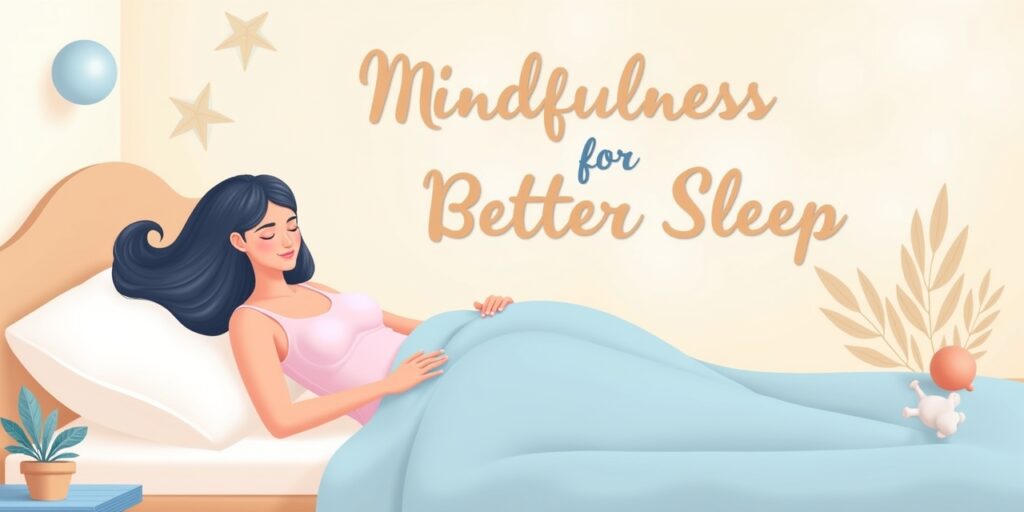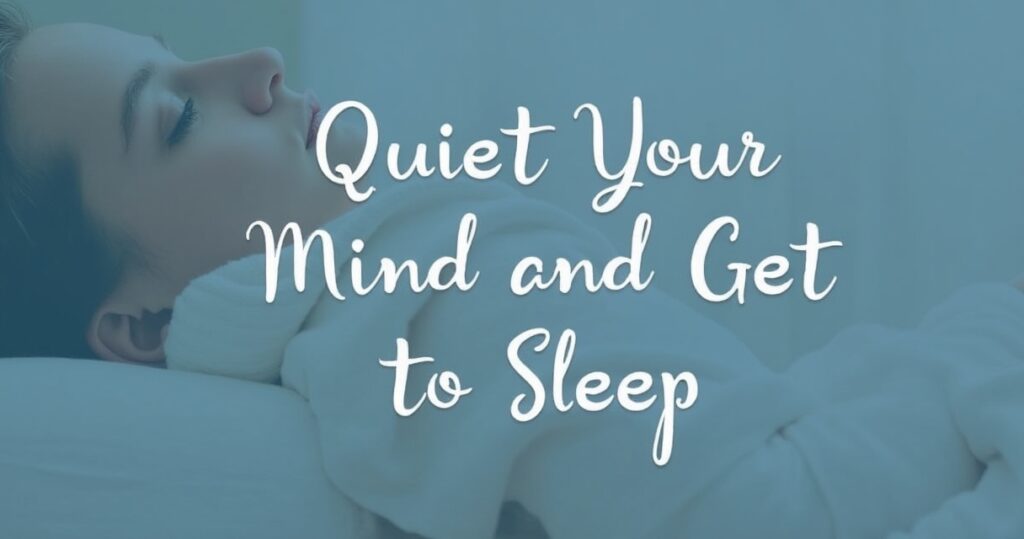In today’s fast-paced world, it’s become increasingly difficult to get enough sleep. Getting a good night’s sleep feels more like a luxury than a necessity, whether it’s due to the stress of daily tasks or the constant onslaught of screens. Practicing mindfulness, which is about being aware and present, has been shown to dramatically improve sleep quality. Mindfulness activities can help you sleep better, cope better with stress, and wake up refreshed.

Mindfulness is the act of being present in the moment without judgment. It means being open and accepting of your thoughts, feelings, and physical sensations. Mindfulness comes from Buddhist meditation, but its mental health benefits have become increasingly popular in the West. Studies show that mindfulness can help with sadness, anxiety, and stress, all of which can make it difficult to fall asleep.
How mindfulness can help you sleep better

- Reduces stress and anxiety
Insomnia is commonly caused by worry or racing thoughts. Mindfulness can help you relax and break the habit of overthinking. When you are mindful, it is easier to be aware of your thoughts and let them go. Body scans and deep breathing are two ways to activate the parasympathetic nervous system, which is responsible for relaxation.
- Helps you fall asleep faster
People who have trouble falling asleep often have very busy minds that prevent them from falling asleep. Mindfulness meditation can help you focus on the present moment and make your mind a place where you can fall asleep. Doing mindfulness activities before bed can help calm your thoughts and prepare your body for sleep.
- Sleep lasts longer
Mindfulness techniques have been linked to better sleep, especially for people who have trouble sleeping. Mindfulness can help people sleep longer and wake up fewer times during the night, which can reduce stress and help you feel rested. Research has shown that being mindful can help people fall asleep faster if they wake up in the middle of the night.
- Improves the Quality of Sleep
Being conscious not only helps you fall asleep faster, but it also makes your sleep better. When you are more relaxed and aware of how your body feels, you may sleep more deeply and restore your body. Mindfulness also helps people relax by helping them stay in the present moment instead of stressing about the future or the past.
Ways to Be Mindful to Get Better Sleep

- Breathing with Awareness
One of the easiest mindfulness exercises to help you sleep better is to breathe Mindfully. To practice, sit or lie down in a comfortable position and pay attention to your breathing. Take a slow, four-count breath, hold it for four counts, and then let it out for four counts. This way of inhaling deeply can help you relax by waking up the parasympathetic nervous system.
- Body Scan Meditation
The body scan is a classic mindfulness exercise in which you mentally go over every part of your body to see whether there is any tension or pain. As you slowly move up from your feet, pay attention to how each area of your body feels. Try to let go of whatever tension you might be feeling on purpose. The body scan helps you relax and be aware of your body before you go to sleep.
- Guided Meditation for Sleep
If you have difficulties settling down before bed, guided sleep meditations might help a lot. During these meditations, a calming voice usually guides you through a process of relaxation. You may find these guided meditations on YouTube or in the Calm or Headspace meditation apps. These recordings often have soothing music and mild sounds that help you relax and pay attention to your body and breathing, which will help you fall asleep.
Read More: How Mindfulness Exercises Can Help You Sleep Better..
- Be thankful
Adding a gratitude practice to your bedtime routine can also help you sleep better. Before you go to bed, think on what you did well that day and what you are thankful for. Practicing thankfulness can help you fall asleep more quickly by making you feel content and taking your mind off of your worries.
- Writing in a journal with awareness
Writing in a journal before bed will help you get rid of any leftover thoughts or sentiments from the day. Writing down your thoughts can help you make sense of what you’ve been through and clear your mind. This exercise may help you fall asleep by giving you a sense of closure.
The Science of Sleep and Being Mindful

Many research have looked into the link between Mindfulness and sleep. A study published in the journal JAMA Internal Medicine found that mindfulness meditation helped persons with insomnia sleep better. People who practiced mindfulness said they fell asleep faster, slept longer, and woke up less often at night.
Another study in Behaviour Research and Therapy found that mindfulness meditation may make sleep problems less severe in patients with anxiety and depression. Mindfulness can help with anxiety and depression, which are two common causes of sleep problems. This can have a big effect on your overall sleep health.
More tips on how to sleep well

In addition to exercising mindfulness, keeping good sleep hygiene will help you sleep better. Sleep hygiene is the term for the habits and behaviours that help you get a good night’s sleep. Here are some more tips to help you get a better night’s sleep:
Set a regular sleep schedule: Go to bed and wake up at the same time every day, even on the weekends. Consistency improves the quality of your sleep and helps your body’s internal clock stay on track.
Limit the time you spend in front of devices before bed. The blue light from screens can mess with the hormone melatonin, which controls sleep. Don’t look at screens for at least 30 minutes to an hour before bed.
Set up a calming bedtime routine. Before bed, do something relaxing, like reading, taking a warm bath, or practicing mindfulness. This tells your body that it’s time to relax.
Make your bedroom calm, dark, and chilly to help you sleep better. You might want to spend money on pillows and a comfortable mattress.
Conclusion
Adding mindfulness to your nightly ritual can make a big difference in how well you sleep. Mindfulness can help you minimise stress, calm your thoughts, and increase relaxation, all of which can help you get better sleep. In addition to practicing proper sleep hygiene, being mindful will help you develop healthy sleep patterns. This will make you feel better physically and mentally. If you have difficulties falling asleep, mindfulness can be the key to getting more peaceful and restful nights.
FAQ
Q1. In what ways does mindfulness help you sleep better?
Mindfulness can help you sleep better by lowering stress and anxiety, calming your mind, and encouraging relaxation. Body scans, focused breathing, and guided meditation are some ways to quiet your body and mind, which can help you go asleep and remain asleep.
Q2. Can being conscious help you sleep?
Mindfulness may not be a solution for insomnia, but it can help with the symptoms and make sleep better. Many people with insomnia find that their ability to go asleep, stay asleep, and feel refreshed when they wake up gets better over time when they practice mindfulness consistently.
Q3. How long do I have to practice mindfulness before I see results?
Results vary, but a lot of people say they sleep better after just a few weeks of regular practice. It’s vital to be patient and practice mindfulness regularly, as the benefits will come slowly over time.
Q4. What is the greatest way to remain mindful so you can sleep better?
Mindful breathing and body scan meditation are two techniques that many people find help them sleep better. However, the perfect one for you may be different. People also appreciate guided sleep meditations, which you can get on apps like Calm or Headspace.
Q5. Can being aware assist with bad dreams or night terrors?
Mindfulness can help you relax and lower your overall tension, which can make nightmares or night terrors happen less often and less intensely. Practicing mindfulness before bed will help you relax and be ready for sleep, which will make it easier to sleep without being disturbed.
Q6. Can being attentive help persons with chronic pain sleep better?
Yes, mindfulness can be very useful for persons who have long-term discomfort. Mindfulness can help you sleep better by lowering the emotional and physical stress that comes with chronic pain. It does this by focusing on the present moment and letting go of worries and discomforts.
Q7. What are some ways I can practice mindfulness before bed?
Mindful breathing, a body scan, or guided meditation are all simple ways to practice mindfulness before bed. These things can help you relax and tell your body that it’s time to rest and get ready for bed.
Q8. Is being conscious better than using sleep drugs?
Mindfulness is a natural and non-invasive technique to get better sleep, while sleep drugs can have adverse effects and make you dependent on them. Mindfulness helps with long-term sleep health by getting to the bottom of sleep problems like stress and worry. Medications, on the other hand, may just cover up the symptoms for a short time.
Q9. Is it possible to use mindfulness alongside other sleep tips?
Yes, of course! Mindfulness can help you sleep better and is a good thing to do before bed. Combining mindfulness with other methods like setting a regular sleep routine, limiting screen time, and making your sleep environment as comfortable as possible might help you sleep better in a more complete way.
Q10. Does mindfulness help people of all ages sleep better?
Yes, people of all ages can benefit from being attentive. Mindfulness can help kids, teens, adults, and elders calm their brains and sleep better. However, the specific techniques and practices may need to be adjusted to fit the age group.





Pingback: Mindful Movement Sleep Meditation: How to Get Better Sleep - Healthn Fitnes